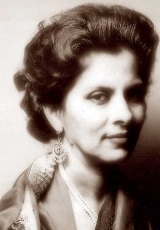
Birth— 1913
Where—Lucknow, India
Education—Lucknow University, La Martiniere School for Girls and Isabella Thoburn College, Lucknow.
Bibliography
-
-
-
Phoenix Fled (Short Stories. London: Chatto & Windus, 1953)
Republished Virago modern classics with an Introduction by Anita Desai (1998)
Indian edition: Rupa & Co., Calcutta (1993)
-
-
Sunlight on a Broken Column
Chatto & Windus (1961)
Republished Virago Modern Classics (1998)
Indian editions: Arnold Heineman Delhi (1979)
-
Cooking the Indian Way, 1967
Books on or including Attia Hosain
-
Attia Hosain A Diptych Volume Writers of the Indian Diaspora: Series by R.K. Kaul, Jasbir Jain pub. Rawa Publications, Jaipur and New Delhi, 2001.
-
Dwelling in the Archive: Women Writing House, Home, History in Late Colonial India by Antonia Burton pub OUP (USA) 2003.
-
Attia Hosain’s short stories also appeared in magazines such as The Atlantic Monthly (USA); Liliput (UK) Illustrated weekly of India
-
References: Dictionary of National Biography, UK, Oxford Companion to 20th Century Literature
|
Biography
Memoirs
Critique/Review of Works

Biography
Attia Hosain was born in 1913 into an aristocratic family in Lucknow – a city that is a byword for Muslim scholarship and culture. Her father was educated at Cambridge University, and her mother was the founder of an institute for women’s education and welfare.
Hosain attended the Isabella Thoburn College at the University of Lucknow, becoming the first woman from a landowning family to graduate in 1933. She also undertook private tuition in Urdu and Persian at home, where she was brought up according to the Muslim tradition. From her mother’s family of poets and scholars she drew a rich knowledge of Urdu, Persian and Arabic. Her knowledge of English came from an English governess, and subsequently as one of the few Indian girls at an English medium school. She was the first woman from her background to take a degree at Lucknow University.
Influenced by the left-wing, nationalist politics of her Cambridge-educated brother and his friends, Hosain became involved with the All-India Progressive Writers’ Association, a group of socialist writers which included Ahmed Ali, Mulk Raj Anand and Sajjad Zaheer. From early on she was a communicator, first through feature articles for Indian papers, the Pioneer and the Statesman, and membership of the radical Progressive Writers’ Movement. The fiction came later, as a result – she recently speculated – of politics and dislocation.
Encouraged by the poet and political activist Sarojini Naidu, she attended the 1933 All-India Women’s Conference in Calcutta, reporting on it for Lucknow and Calcutta newspapers. In this period, she also began to write short stories.
In 1947, when India was partitioned into India and Pakistan, Hosain was in London with her husband, who had been posted the year before to the High Commission. The division of the two countries and the separation of two religious communities caused her great pain. Immensely proud of her heritage as both a Muslim and an Indian, she chose to remain in England and bring up her daughter and son – now the film director Waris Hussein – on her own.
BBC Eastern Services (Urdu)
- Shakespeare plays –translations. Played various parts, including Lady Macbeth, Desdemona, alongside Zia Moinuddin, Ijaz Hussain Batalvi, Amira Ahuja.
- Also in Urdu – translations of plays by Jean Cocteau and Harold Pinter amongst others as lead actor.
BBC English
- BBC Third Programme “Writing in a Foreign Tongue”, 7 May 1956.
- Woman’s Hour, “Passport to Friendship”, 1965
- Audio conversations (public and private) with Literary Estate of Attia Hosain.
Contributions to periodicals
- The Pioneer (Calcutta)
- The Statesman (Calcutta)
Organizations
- Progressive Writers’ Association
Involved in events
- All-India Women’s Conference, Calcutta, 1933
- Participant in the First All-India Progressive Writers’ Conference, Lucknow, 1936 (Through Sahibzada Mahmud U Zafar and Syed Sajjad Zaheer)
- Acted in Peter Mayne’s West End play The Bird of Time, London, 1961
Family
Father: Shahid Hosain Kidwai
Mother: Nisar Hosain Kidwai
Brother: Air Commodore Fuad Hussain
Brother: Reshad Hussain
Sister: Zakia Kidwai
Sister: Razia Hussain
Husband: Ali Bahadur Habibullah
Son: Waris Husain
Daughter:
Memoirs
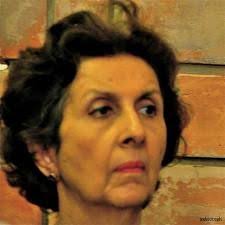 Attia Hosain: A Woman for all Seasons by Muneeza Shamsie Attia Hosain: A Woman for all Seasons by Muneeza Shamsie
This October marked the birth centenary of Attia Hosain (1913-1998), one of the earliest women writers of South Asian English fiction and the well-known author of Phoenix Fled (1953) and Sunlight on a Broken Column (1961).
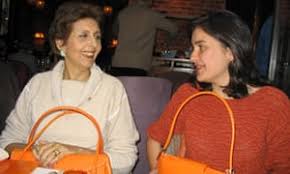 A long, loving literary line: Kamila Shamsie on the three generations of women writers in her family A long, loving literary line: Kamila Shamsie on the three generations of women writers in her family
In the dying days of the British Raj, over a family meal in Lucknow, a young Indian man, greatly influenced by communist and Marxist thought while at Oxford in the 1930s, launched forth with his political ideas. The subject at hand: Lenin and the Soviets. His mother, at the other end of the table, leaned forward. “If there’s something wrong with the linen and serviettes,” she said, “let me know. I’ll attend to it.”
Critique/Review
Writing in a Foreign Tongue –
Attia Hosain
7 May 1956
English is not my mother tongue and yet I write in English. I write in a language other than my own not because I choose to do so but because I must – because I find it easier to express my thoughts in English than Urdu which is my own language. And this is the case even though I write about my own country. Yet paradoxically enough, although I have to write in English to express my thought I have to contend with countless difficulties when using it for creative writing.
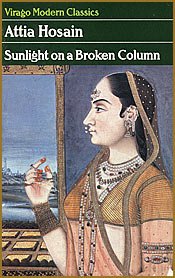 The World That Was… A Cultural Study of Attia Hosain’s Sunlight on a Broken Column The World That Was… A Cultural Study of Attia Hosain’s Sunlight on a Broken Column
Fatima Siddiqui
The majority of Anglophone fiction in India in the 1950s and 1960s was based on the questions of nation and history. The Indian English writers were preoccupied with either partition narratives or national allegories. (Gopal) There were very few novels which could be described as ‘domestic’ fiction (meaning novels which were set in a domestic atmosphere and were concerned with social and inter-personal relations).
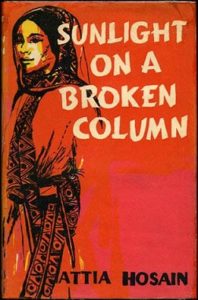 Attia Hosain – A Liberal Voice by Rakshanda Jalil Attia Hosain – A Liberal Voice by Rakshanda Jalil
In almost all the stories, in the conflict between tradition and modernity or westernisation and a time-honoured way of life, Hosain’s empathy seems to be with the traditional because, for all its injustices and inequalities, she found it a more humane order, one where the principle of noblesse oblige entrusted the strong to look after the weak.
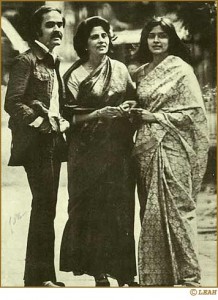 Attia Hosain: A part of the whole by Rakhshanda Jalil Attia Hosain: A part of the whole by Rakhshanda Jalil
Some books cast a long shadow on their author’s oeuvre with the book becoming virtually synonymous with the writer’s name. Take, for instance, Arundhati Roy and The God of Small Things, Vladimir Nabokov and Lolita, Harper Lee and To Kill a Mockingbird or, for that matter, Attia Hosain and Sunlight on a Broken Column.
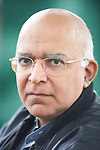 A Distant Traveller Celebrating Attia Hosain 1913-1998 A Distant Traveller Celebrating Attia Hosain 1913-1998
Ritu Menon and Aamer Hussein
In the margins of one of Attia’s manuscripts, I found a fragment of a poem in Urdu
script: ‘hamen bhi sath le chal/ai door ke musafir’ which, roughly translated, says: ‘Take me with you/o distant traveller’.
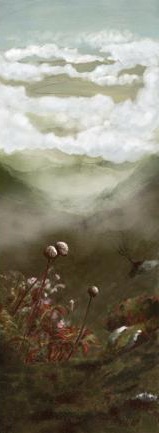 Short Story: “Storm” by Attia Hosain Short Story: “Storm” by Attia Hosain
AFTER DINNER THE LADIES RETIRED in order of their husbands’ civil list precedence in the dining room. Conventions had to be made part of existence by an insistent repetition of their smallest details.
The men fell back on the inevitable problems of petty politics. Some warded off their boredom of each other with wine. The interesting witty ones talked of women—not of respectable ladies but women who existed only to add spice to life.
|
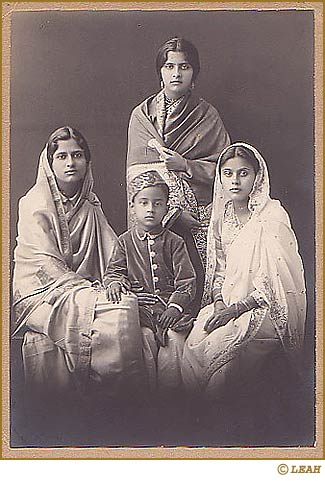



 Attia Hosain: A Woman for all Seasons by Muneeza Shamsie
Attia Hosain: A Woman for all Seasons by Muneeza Shamsie A long, loving literary line: Kamila Shamsie on the three generations of women writers in her family
A long, loving literary line: Kamila Shamsie on the three generations of women writers in her family The World That Was… A Cultural Study of Attia Hosain’s Sunlight on a Broken Column
The World That Was… A Cultural Study of Attia Hosain’s Sunlight on a Broken Column Attia Hosain – A Liberal Voice by Rakshanda Jalil
Attia Hosain – A Liberal Voice by Rakshanda Jalil Attia Hosain: A part of the whole by Rakhshanda Jalil
Attia Hosain: A part of the whole by Rakhshanda Jalil A Distant Traveller Celebrating Attia Hosain 1913-1998
A Distant Traveller Celebrating Attia Hosain 1913-1998